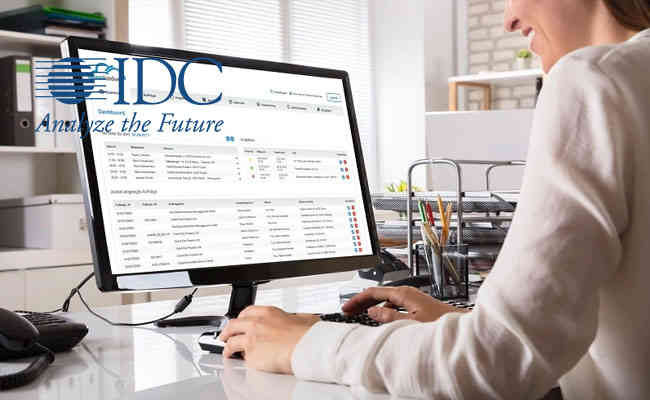Remote Working Leads to Record Buying of Notebooks by Enterprises in 2Q20, Reports IDC India
By MYBRANDBOOK

The India traditional PC market inclusive of desktops, notebooks, and workstations declined by 37.3% year-over-year (YoY) in the second quarter of 2020 (CY 2Q20), closing the quarter with a total of 2.1 million units, according to new data from the International Data Corporation (IDC) Worldwide Quarterly Personal Computing Device Tracker. The large decline was an outcome of an unfavorable YoY comparison against 2Q19, which was the biggest quarter in the past five years as Lenovo executed one mega-deal of 1.1 million units to Electronics Corporation of Tamil Nadu (ELCOT). Outside this deal, the PC market saw an annual decline of 6.3% in 2Q20. In the product categories, desktop PCs were the most impacted with a 46.4% decline. However, discounting Lenovo’s ELCOT deal, notebooks grew 17.6% from the same time a year ago.
The countrywide lockdown forced everyone to work from home, resulting in strong demand for notebooks as enterprises rushed to ensure business continuity by providing its workforce the required infrastructure to work at home. Most IT services, global enterprises, and consulting companies placed large orders for notebook PCs. This led to an all-time high of enterprise notebook purchases with shipments growing by 105.5% YoY in 2Q20. As a result, enterprises reduced desktop buying and even converted a few orders to notebooks. SMBs also increased their procurement of notebooks with relatively moderate growth of 12.1% YoY in 2Q20.
“The demand for notebooks exceeded expectations with most of the vendors exiting the quarter with minimum inventory. Despite the supply and logistics challenges in the first half of the quarter, companies executed most of the large orders in 2Q20. Also, many companies shifted their employees to notebooks for the first time; this change is surely going to alter their procurement strategy in the long term with a mix of in-office and remote workforce becoming a reality for many organizations,” says Bharath Shenoy, Market Analyst, PC Devices, IDC India.
The consumer segment had a relatively small quarter since the market was operational for just 45 days due to countrywide lockdown in the first half of the quarter. However, strong demand from eLearning was able to cover the gap to some extent. The overall consumer segment saw a YoY decline of 21% but was able to recover from the previous quarter’s low with 3.3% quarter-over-quarter (QoQ) growth in 2Q20. Online buying played an important role in this quarter; as a result, vendors shipped almost one-third of their PCs to online channels.
Top 5 Company Highlights: 2Q20
HP Inc. retained the top position in the overall PC market with a share of 32.8% in 2Q20. HP’s strong performance in the commercial segment was supported by a few large wins and helped the company to maintain its lead in the overall PC category. Also, amongst the top five companies, it was the only company to have a positive annual growth rate in the commercial segment, as its shipments grew 11.8% YoY in 2Q20.
Lenovo replaced Dell in the second position despite witnessing a 62.7% decline in its overall shipments. Outside of the ELCOT deal, the company had a very good quarter with its shipments growing 31.6% YoY, mainly supported by growth in the SMB, enterprise, and consumer segments.
Dell Technologies finished the quarter in the third place while declining 21.8% YoY, mainly driven by the strong decline in its desktop shipments. Despite this, it was able to secure the second position in the enterprise segment.
Acer Group retained the fourth position with a 9.9% market share in 2Q20. It was carrying a backlog of certain orders that finally got shipped in this quarter. This helped the company to secure the leading position in the commercial desktop segment. However, its overall shipments saw a 34.7% decline when compared to the same time a year ago.
ASUS maintained the fifth position and registered an impressive 55.5% YoY growth in the overall PC market. ASUS also emerged as the third-largest consumer brand replacing Dell this quarter. Its aggressive offline expansion with its extended thin and light portfolio worked in favor of the brand.
Commenting on the outlook for the coming quarters, Jaipal Singh, Associate Research Manager, Client Devices, IDC India states, “As most of the big orders for business continuity planning have been more or less executed in the quarter gone by, the PC market is now expected to face challenges posed by the COVID-19 crisis and the looming economic situation. Enterprise buying will come back down to earth and SMB demand is expected to remain muted for some quarters.”
“When it comes to new growth opportunities, the demand for online learning is still largely untapped and encompasses huge potential. To unlock this big segment, brands would need to be more innovative in addressing the specific challenges related to eLearning. It would require cross-platform and learning ecosystem partnerships to onboard first-time users,” concludes Singh.
Notes:
Shipments include shipments to distribution channels or end-users. OEM sales are counted under the company/brand under which they are sold.
Enterprise segment refers to all companies with 500 and above employees, and SMBs are referred to companies below 500 employees.
Traditional PCs include Desktops, Notebooks, and Workstations and do not include Tablets or x86 Servers. Detachable Tablets and Slate Tablets are part of the Personal Computing Device Tracker but are not addressed in this press release.


Legal Battle Over IT Act Intensifies Amid Musk’s India Plans
The outcome of the legal dispute between X Corp and the Indian government c...

Wipro inks 10-year deal with Phoenix Group's ReAssure UK worth
The agreement, executed through Wipro and its 100% subsidiary,...

Centre announces that DPDP Rules nearing Finalisation by April
The government seeks to refine the rules for robust data protection, ensuri...

Home Ministry cracks down on PoS agents in digital arrest scam
Digital arrest scams are a growing cybercrime where victims are coerced or ...


ICONS OF INDIA : SANTHOSH VISWANATHAN
Santhosh Viswanathan is the the Vice President and Managing Director f...

ICONS OF INDIA : ROSHNI NADAR MALHOTRA
Roshni Nadar Malhotra is the Chairperson of HCLTech, a leading global ...

Icons Of India : Dr. Arvind Gupta
Arvind Gupta is the Head and Co-Founder of the Digital India Foundatio...


IOCL - Indian Oil Corporation Ltd.
IOCL is India’s largest oil refining and marketing company ...

TCIL - Telecommunications Consultants India Limited
TCIL is a government-owned engineering and consultancy company...

NSE - National Stock Exchange
NSE is the leading stock exchange in India....


Indian Tech Talent Excelling The Tech World - George Kurian, CEO, Netapp
George Kurian, the CEO of global data storage and management services ...

Indian Tech Talent Excelling The Tech World - Aman Bhutani, CEO, GoDaddy
Aman Bhutani, the self-taught techie and CEO of GoDaddy, oversees a co...

Indian Tech Talent Excelling The Tech World - REVATHI ADVAITHI, CEO- Flex
Revathi Advaithi, the CEO of Flex, is a dynamic leader driving growth ...
 of images belongs to the respective copyright holders
of images belongs to the respective copyright holders